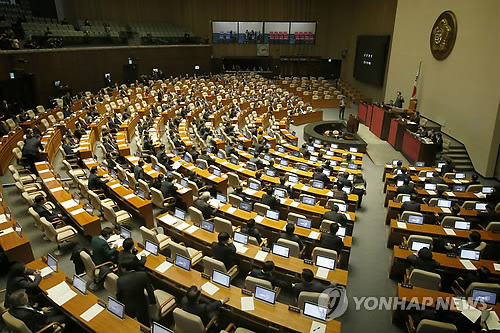Rival parties agreed Saturday to pass this week a pension reform bill for civil servants aimed at reducing chronic deficits in funds.
 |
| (Yonhap) |
The deal came at a meeting of leaders of the governing Saenuri Party and the main opposition New Politics Alliance for Democracy, a day after a task force, involving politicians, government officials and civilian experts, drafted a breakthrough scheme that would require public officials to pay more while in service and receive less after retirement.
It calls for raising the contribution rates from the current 7 percent to 9 percent over the next five years, with entitlement rate to be reduced from 1.9 to 1.7 percent in stages over the next two decades.
”The ruling and opposition parties will pass the revision bill on civil servants’ pension in the plenary session on May 6,” read a joint statement issued after the meeting.
The two sides also decided to form another task force to explore ways to reinforce a broader public pension system that would affect not only civil servants but also many workers in private sectors with government-run pension.
A special National Assembly committee will be established in a bid to pass a relevant bill in September under the agreement. South Korea’s public pension has been ridden with growing deficits as its society is fast aging.
Both parties stressed that the process of reaching the deal is of significance as well.
“This agreement minimizes social conflict. Most of all, it is meaningful as a compromise of the people,” Kim Moo-sung, head of the Saenuri Party said, apparently referring to the joint work of representatives from related groups. “It is of big significance that (we) opened a way to resolve the problem of public sector reform through public consensus.”
Moon Jae-in, leader of the NPAD, echoed his view.
“This pension reform was made possible via social consensus agreed on by parties involved on top of pain-sharing by civil servants,” he said.
It would serve as a good model for reform of other sectors including the labor market, he added.
But unionized public workers and teachers voiced strong opposition to the bill.
”We have never agreed to the proposed plan to change the contribution rate to 1.7 percent and the payments to 9 percent and any other changes,” the Korean Government Employees’ Union said in a statement. “We cannot accept the proposal that would worsen the current pension system.”
The Korean Teachers and Educational Workers’ Union also said it will fight against what it calls the “evil pension bill.” (Yonhap)

